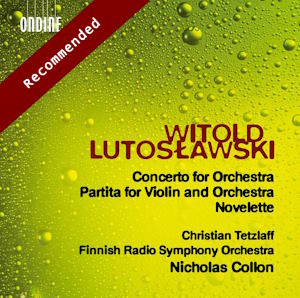
Witold Lutosławski (1913-1994)
Concerto for Orchestra (1950-54)
Partita for Violin and Orchestra (1988)
Novelette (1979)
Christian Tetzlaff (violin)
Finnish Radio Symphony Orchestra/Nicholas Collon
rec. 2022, Helsinki Music Centre, Finland
Ondine ODE1444-2 [59]
Lutosławski is best known for his orchestral works – mainly for his four symphonies, the solo concertos and the Concerto for Orchestra. The latter is his crowning achievement and most popular work; it has since become a classic of the repertoire. It occupied him for four years between 1950 and 1954. It was premiered on November 26, 1954 in Warsaw, with Witold Rowicki (the dedicatee) conducting the Warsaw National Philharmonic Orchestra. Cast in three movements, the score calls for a large orchestra. The composer took as his inspiration Bartók’s Concerto for Orchestra written seven years earlier in 1943. There are many fine performances on disc. Two I’m familiar with and admire are the BBC Symphony Orchestra under Edward Gardner on the Chandos label, and the composer’s own version on EMI. The latter isn’t as tidy as this latest version. In fact, Nicolas Collon and the Finnish Radio Symphony Orchestra supersede both these previous issues, with a colourful and lively account. The overall sound is both seductive and convincing and the Ondine engineers go for maximum sonic impact. The opening Intrada is weighty and has great presence with the pounding rhythm grabbing the attention immediately. The burnished brass, vivid percussion and gutsy strings are spectacular. In the second movement the woodwinds and the strings are elfin-like. The final Passacaglia brings the work to a brilliant climax.
The Partita for Violin and Orchestra is a live recording. It appeared in its present form in 1988 and is thus late in Lutosławski’s compositional output. The work began life in a form for violin and piano in the autumn of 1984. Structured in five movements and played without a break, the first, third and fifth are the most substantial, interspersed with the second and fourth which are brief ad libitum interludes. The 1988 orchestral version was dedicated to Anne-Sophie Mutter, who premiered it on 10 January 1990 in Munich with the Munich Philharmonic Orchestra under the composer’s baton. The opening movement is rhythmically punchy, with aggressive outbursts alternating with more lyrical sections. Lutosławski spices it up further with some bluesy flavours. The more spacious central Largo feels like the emotional heart of the piece. Dark, brooding and restless it has an endearing, radiant quality. A bustling Presto provides some smoking tension in the final pages. Christian Tetzlaff is well-balanced in the mix.
It was Mstislav Rostropovich who, on assuming the directorship of the National Symphony Orchestra in Washington, commissioned Novelette. His relationship with the composer hearkened back several years to 1970 when he premiered the Cello Concerto. Nine years on, Novelette dates from the end of Lutosławski’s middle period, a time when he had developed the idiom of “aleatoric counterpoint”. The work is in five short movements, with the final one being the most substantial. Hammerblows usher in the opening Announcement. Then come three witty movements with will-o’-the-wisp flutters and fleeting mercurial interjections. The more weighty Conclusion grows out of low harp figures. The mood hastens and the music becomes more intense and seething, finally bringing the music to the boil. The hammerblows return at the very end to call time.
Lutosławski’s masterly scores are expertly served in these superb readings. The recorded sound is excellent and the performances are top notch. Collon and his players deliver invigorating and impeccably riveting performances. The accompanying notes are first class. Who knows, this may be one of my 2024 Recordings of the Year; it’s spectacular in every respect.
Stephen Greenbank
Help us financially by purchasing from




















